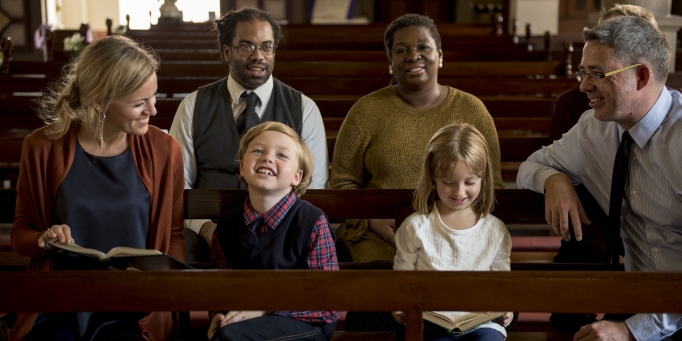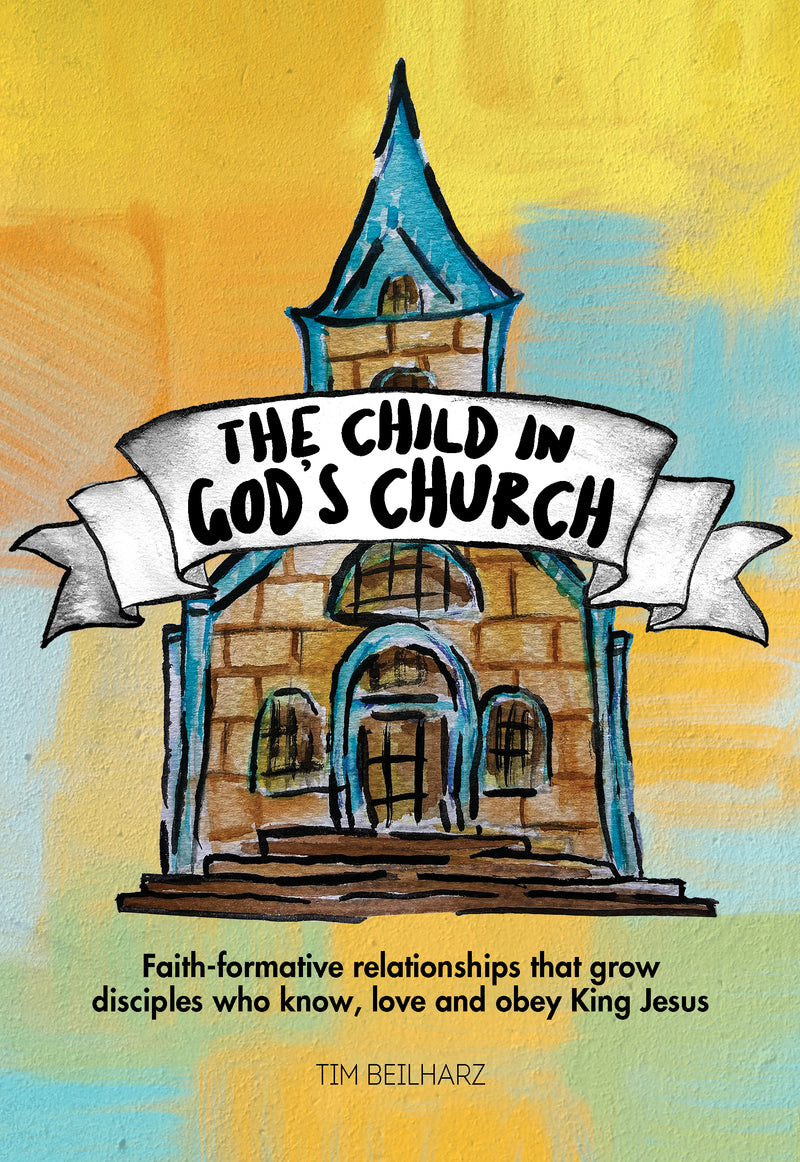
Teaching our children to church well
It’s a team sport, not a trip to the movies!
If you trust and follow Jesus, then you probably spend some time—most Sundays (or maybe Saturdays) —meeting with a community of believers in some kind of building in some proximity to your home. Or to say it more expediently—you go to church! As a Christian parent I have spent a bit of time thinking about how my kids understand church and its importance. I suspect a lot of what our kids know and think about church is learned not through intentional explanation but through ‘osmosis’ (what they see/hear/experience). In the busyness of life it’s easy to assume that if we have good habits with church then our kids will learn those attitudes and actions from us. But it could be helpful to slow down and think it through more intentionally so we can make sure that what we are teaching and modelling is what we actually want them to catch.
The family of God is pivotal to who we are as believers. We are not simply individuals who are saved from sin and death by grace. We are saved into God’s kingdom. If we (and our kids) trust and follow Jesus we are now part of God’s family (his church) and that comes with huge benefits but also responsibilities.
A helpful analogy
You may have heard this analogy before, but I find it a helpful one—especially for our kids.
Church is more like being part of a sports team than going to a movie.
When we go to the movies, we pick the movie we want to see, we pick the time, we show up, we sit back, relax and watch (usually with snacks!) and then when it’s finished, we go home and that’s it.
When we are in a sports team there is considerably more to it. Players are required to go to training and games. As part of a team, you work together, getting better at your sport individually and together. You celebrate together when you win and you cry together at the losses.
The Bible paints church much more like a team sport.
If we are approaching church more like going to the movies then our kids will catch that. They will see it as an optional extra that they go to primarily to consume—to get their needs met in some way and then go home. Our kids won’t see church as a fundamental part of what it is to be a Christian.
Church isn’t just something we should be going to purely for our personal benefit. Church is something we are called to be a member of. We are called to love and serve those we meet with.
In line with this, here are some key attitudes and behaviours that we should be modelling to our children when it comes to church.
Be regular
Being regular at church has become more and more challenging! With Sunday becoming very much just another day of the week in our culture, church is now competing with sporting games, birthday parties and other events. It is so easy to see the goodness of those other events that come along and feel they are important. The challenge is that going to those things means saying no to church. What might start as the occasional miss can snowball into church becoming a two weeks out of four type commitment.
This tells our kids that church is the thing you skip when something better comes along. We might not really think that but it’s what they can pick up by osmosis. Which means as they grow up they might adopt a pattern of church being the thing you do when you don’t have anything else on.
Stick at it when it’s hard
As an extension of being regular, we can also model something important to our children when we stick at church when it’s hard. If we have been a Christian for any length of time we will probably know that church is not always easy. Ephesians 4:2 says we are to be patient and bear with one another in love. We wouldn’t need these instructions if co-existing with other humans was always going to be easy.
We aren’t always going to love what happens at church or the decisions our minister makes; we might get hurt by others words’ or actions because we all get things wrong sometimes. In a place like Sydney where there are many good churches, it may seem like the best plan to just ditch this church that doesn’t sit comfortably at the moment and go to the one down the road. The problem with this is that it teaches our kids that church is all about us, but also that any time things get hard we move on. God calls us to love one another deeply, and that requires us to work through offences and offer forgiveness when we are hurt. There will be times when it is appropriate to move churches. But that decision should not be made lightly or without counsel.
Look for ways to serve and be served
We want our kids to see church as something that’s not just for our own benefit but also something we go to for others. Otherwise, when they don’t feel the benefit they won’t keep going. When the music isn’t quite their style or their friends move on or when the start time isn’t quite right they’ll move on. We want to both model and articulate to our kids that we go for the sake of others and we look for ways to serve those we church with. We can love others simply by showing up. We can also love others by getting involved in the week-to-week life of our church, according to our capacity.
Love your pastors/leaders
Without our pastors and leaders, our churches could not be what they are. Our paid leaders have forsaken other jobs and careers to serve God’s people. It can be a very big and tireless job with little time off. It is sadly often thankless too. God has put these men and women in their roles to love, serve and teach us and we can help to make that job a joy or an overwhelming burden. If we only ever grumble to our leaders or worse, complain about them to everyone else that is going to hinder their labours and also set a bad example for our children. We can be a great example to our kids by loving our ministers by encouraging and thanking them; by asking them how they are doing; by giving faithfully to our church and by praying for our leaders (with our children).
Give generously
While giving financially keeps our church staff employed and our building maintained, it is far more than that. When we give to church, we recognise that all we have is a gift to us from God. When we give, we demonstrate our concern for the work of the gospel in our local community. Many churches (and individual Christians) also give to God’s work in other parts of the world. Giving generously to gospel ministry also models to our kids that we trust God to provide, rather than holding what we have with a tight fist.
Talk positively
We can also help our children to have a good attitude to church by talking positively about it. I have already mentioned that in relation to staff. But we can also talk positively about going to church each week (about looking forward to it!) as well as the church’s events and activities. We can pray with our kids for God to do his work in the world through his church.
We can help our kids to church well, now and into the future, by doing it well ourselves. Church shouldn’t just be confined to a small section of our Sunday. As members of the people of God, church should be central and fundamental to our lives.
‘And let us consider how we may spur one another on towards love and good deeds, not giving up meeting together, as some are in the habit of doing, but encouraging one another—and all the more as you see the Day approaching.’ (Hebrews 10:24–25)

The Child in God's Church
In The Child in God’s Church, Tim Beilharz provides the biblical reasons for including and nurturing children as precious members of the body of Christ.
For more articles from Growing Faith, subscribe to our monthly e-newsletter.
To hear about the latest books and resources from Youthworks Media, subscribe here.








